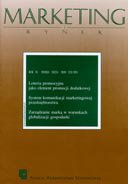ESG reporting with a view to a circular economy assumptions
The purpose of this article is to analyse and to assess selected ESG reporting standards (the international GRI Standards and the European ESRS) in terms of incorporating aspects of the circular economy (CE) and to present directions and opportunities for expanding ESG reporting to include CE indicators. In the article a literature review as well as international and EU documents on the concepts of ESG and CE was used. Available and existing solutions for the use of CE indicators in ESG reporting were analysed in detail. The analysis of the indicators contained in the GRI standard, as well as the ESRS project, showed the need to include four important groups of activities relevant to the CE, such as product dematerialization, technological innovation, repair and remanufacturing. The inclusion of these aspects in the form of the indicators proposed in the article will allow for a more complete implementation of the principles of a circular economy.
References
Bibliografia/References
Bender, J., Bridges, T. A., He, C., Lester, A., & Sun, X. (2018). A blueprint for integrating ESG into equity portfolios. The Journal of Investment Management, 16(1).
Broadstock, D. C., Chan, K., Cheng, L. T. W., & Wang, X. (2021). The role of ESG performance during times of financial crisis: Evidence from COVID-19 in China. Finance Research Letters, 38. https://doi.org/10.1016/j.frl.2020.101716.
Caplan, L., Griswold, J. S., & Jarvis W. F. (2013). From SRI to ESG: The Changing World of Responsible Investing. Commonfund Institute.
Dyrektywa Parlamentu Europejskiego i Rady 2013/34/UE z dnia 26 czerwca 2013 r. w sprawie rocznych sprawozdań finansowych, skonsolidowanych sprawozdań finansowych i powiązanych sprawozdań niektórych rodzajów jednostek, zmieniająca dyrektywę Parlamentu Europejskiego i Rady 2006/43/WE oraz uchylająca dyrektywy Rady 78/660/EWG i 83/349/EWG (tekst mający znaczenie dla EOG).
Dyrektywa Parlamentu Europejskiego i Rady 2014/95/UE z dnia 22 października 2014 r. zmieniająca dyrektywę 2013/34/UE w odniesieniu do ujawniania informacji niefinansowych i informacji dotyczących różnorodności przez niektóre duże jednostki oraz grupy. Tekst mający znaczenie dla EOG, dokument 32014L0095.
Dyrektywa Parlamentu Europejskiego i Rady (UE) 2022/2464 z dnia 14 grudnia 2022 r. w sprawie zmiany rozporządzenia (UE) nr 537/2014, dyrektywy 2004/109/WE, dyrektywy 2006/43/WE oraz dyrektywy 2013/34/UE w odniesieniu do sprawozdawczości przedsiębiorstw w zakresie zrównoważonego rozwoju.
EEA. (2016). More from less – material resource efficiency in Europe. (2015). Overview of policies, instruments and targets in 32 countries. EEA Report No. 10/2016, 71.
EFRAG. (2022, luty). European Sustainability Reporting Standard E5 Resource Use and Circular Economy. Working paper. https://www.efrag.org/Assets/Download?assetUrl=%2Fsites%2Fwebpublishing%2FSiteAssets%2FWorking%2520paper%2520on%2520draft%2520ESRS%2520E5%2520Resource%2520use%2520and%2520Circular%2520Economy%2520vf.pdf (pobrano 25.05.2023).
EFRAG. (b.d.). Sustainability Reporting Standards. First Set of draft ESRS. https://www.efrag.org/lab6 (pobrano 9.07.2023).
Ellen MacArthur Foundation. (2015, 15 grudnia) Towards a circular economy: Business rationale for an accelerated transition. https://www.ellenmacarthurfoundation.org/publications/towards-a-circular-economy-business-rationale-for-an-accelerated-transition (pobrano 10.05.2023).
Fairfax, L. M. (2022). Dynamic disclosure: An exposé on the mythical divide between voluntary and mandatory ESG disclosure. Texas Law Review, 101(2).
Global Reporting Initiative. (2016). Zasady raportowania i wskaźniki. https://odpowiedzialnybiznes.pl/wp-content/uploads/2016/06/G4-RSPD_PL_27-06-16.pdf
Global Reporting Initiative. (2020). GRI 306. Waste 2020. GRI – GRI Standards English Language. https://globalreporting.org/how-to-use-the-gristandards/gri-standards-english-language/ (pobrano 4.05.2023).
International Labour Office. (1977). Tripartite Declaration of Principles concerning Multinational Enterprises and Social Policy, ILO(092)/E5/1977.
KIS. (b.d.). KIS 7. Gospodarka o obiegu zamkniętym. https://krajoweinteligentnespecjalizacje.pl/gospodarka-o-obiegu-zamknietym-woda-surowce-kopalneodpady/kis-7-gospodarka-o-obiegu-zamknietym-woda-surowce-kopalne-odpady/ (pobrano 9.07.2023).
Komisja Europejska. (2014). Komunikat Komisji do Parlamentu Europejskiego, Rady, Europejskiego Komitetu Ekonomiczno-Społecznego i Komitetu Regionów. Ku gospodarce o obiegu zamkniętym: program "zero odpadów" dla Europy, COM/2014/0398 final.
Komisja Europejska. (2015). Komunikat Komisji do Parlamentu Europejskiego, Rady, Europejskiego Komitetu Ekonomiczno-Społecznego i Komitetu Regionów. Zamknięcie obiegu – plan działania UE dotyczący gospodarki o obiegu zamkniętym, COM/2015/614 final.
Komisja Europejska. (2018). Komunikat Komisji do Parlamentu Europejskiego, Rady, Europejskiego Komitetu Ekonomiczno-Społecznego i Komitetu Regionów w sprawie monitorowania gospodarki o obiegu zamkniętym, COM/2018/29 final.
Komisja Europejska. (2019). Komunikat Komisji do Parlamentu Europejskiego, Rady, Europejskiego Komitetu Ekonomiczno-Społecznego i Komitetu Regionów. Europejski Zielony Ład, COM/2019/640 final.
Kulczycka, J. (Red.). (2020). Wskaźniki monitorowania gospodarki o obiegu zamkniętym. Instytut Gospodarki Surowcami Mineralnymi i Energią PAN.
Li, Y., Gong, M., Zhang, X. Y., & Koh, L. (2018). The impact of environmental, social, and governance disclosure on firm value: The role of CEO power. The British Accounting Review, 50(1), 60–75. https://doi.org/10.1016/j.bar.2017.09.007
Lulewicz-Sas, A. (2016). Ewaluacja społecznie odpowiedzialnej działalności przedsiębiorstw. Oficyna Wydawnicza Politechniki Białostockiej.
Mitkow, S., Antczak, J., & Roszkiewicz, M. (2022). Challenges for the defense industry against the background of ESG (Environmental, Social, Governance) concepts. European Research Studies Journal, XXV(4).
OECD. (1976). Guidelines for Multinational Enterprises.
Polityka ekologiczna państwa 2030 – strategia rozwoju w obszarze środowiska i gospodarki wodnej. Załącznik do uchwały nr 67 Rady Ministrów z dnia 16 lipca 2019 r. (poz. 794).
Stahel, W., & Reday, G. (1976). Report The Potential for Substituting Manpower for Energy. Vantage Press.
UN Environment Programme – Finance Initiative. (2004). Who Cares Wins. The Global Compact Connecting Financial Markets to a Changing World. https://www.unepfi.org/fileadmin/events/2004/stocks/who_cares_wins_global_compact_2004.pdf (pobrano 10.05.2023).
United Nations. (2015). Transforming our World: The 2030 Agenda for Sustainable Development. https://sdgs.un.org/publications/transforming-ourworld-2030-agenda-sustainable-development-17981 (pobrano 23.05.2023).
Whitelock, V.G. (2015). Environmental social governance management: A theoretical perspective for the role of disclosure in the supply chain. International Journal of Business Information Systems, 18(4). https://doi.org/10.1504/IJBIS.2015.068477
Wierzbołowski, J. (2000). Dematerializacja produkcji i rola państwa w rozwoju współczesnego przemysłu. Telekomunikacja i Techniki Informacyjne, 1(2).
Yadav, A., (2022). Does ESG compliance boost Indian companies' and investors' immunity against economic uncertainties: An empirical study? Advances in Decision Sciences, 26(3), 123–140. https://doi.org/10.47654/v26y2022i3p123-140
Yoon, B., Lee, J. H., & Byun R. (2018). Does ESG performance enhance firm value? Evidence from Korea. Sustainability, 10(10). https://doi.org/10.3390/su10103635

